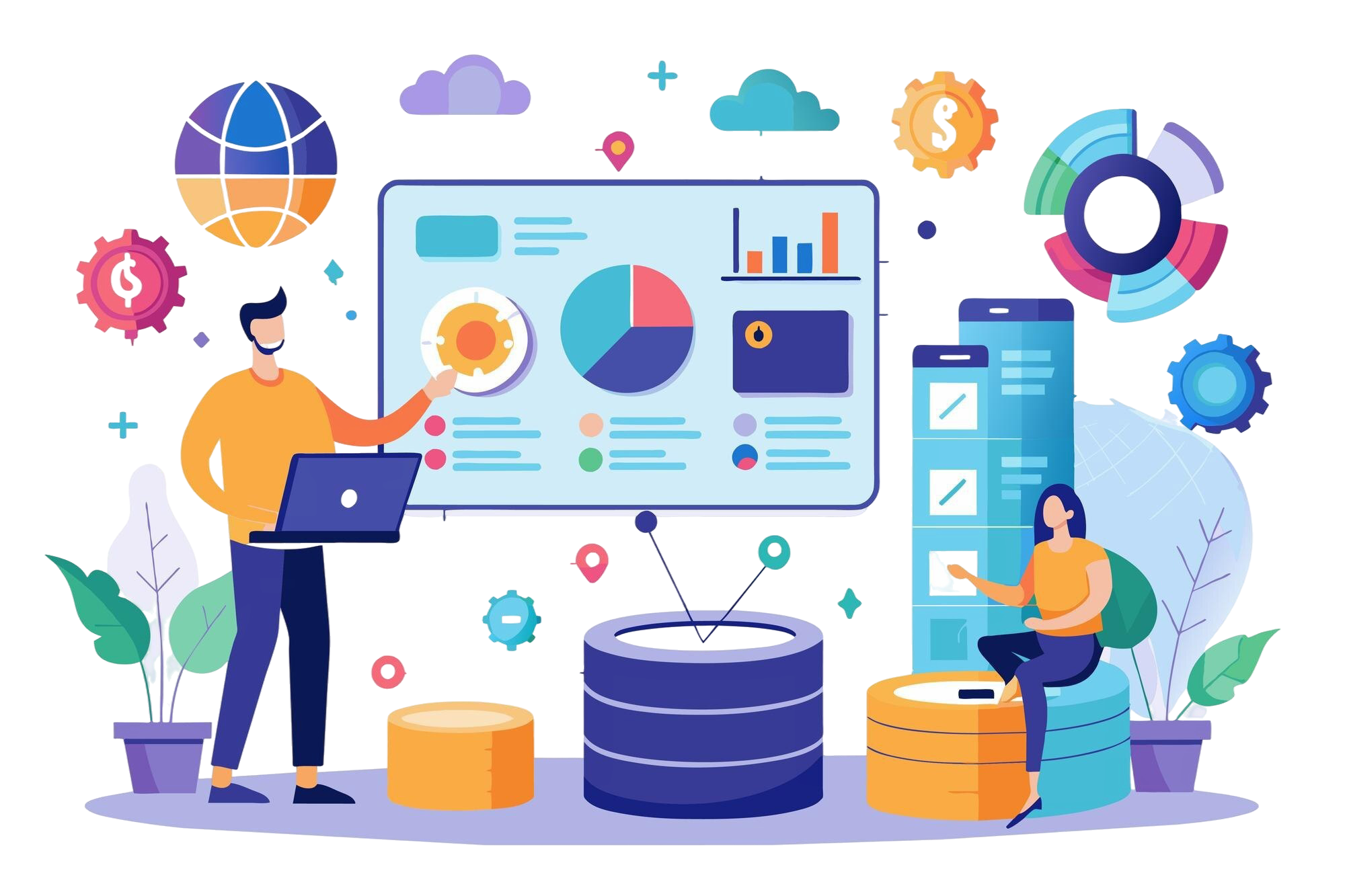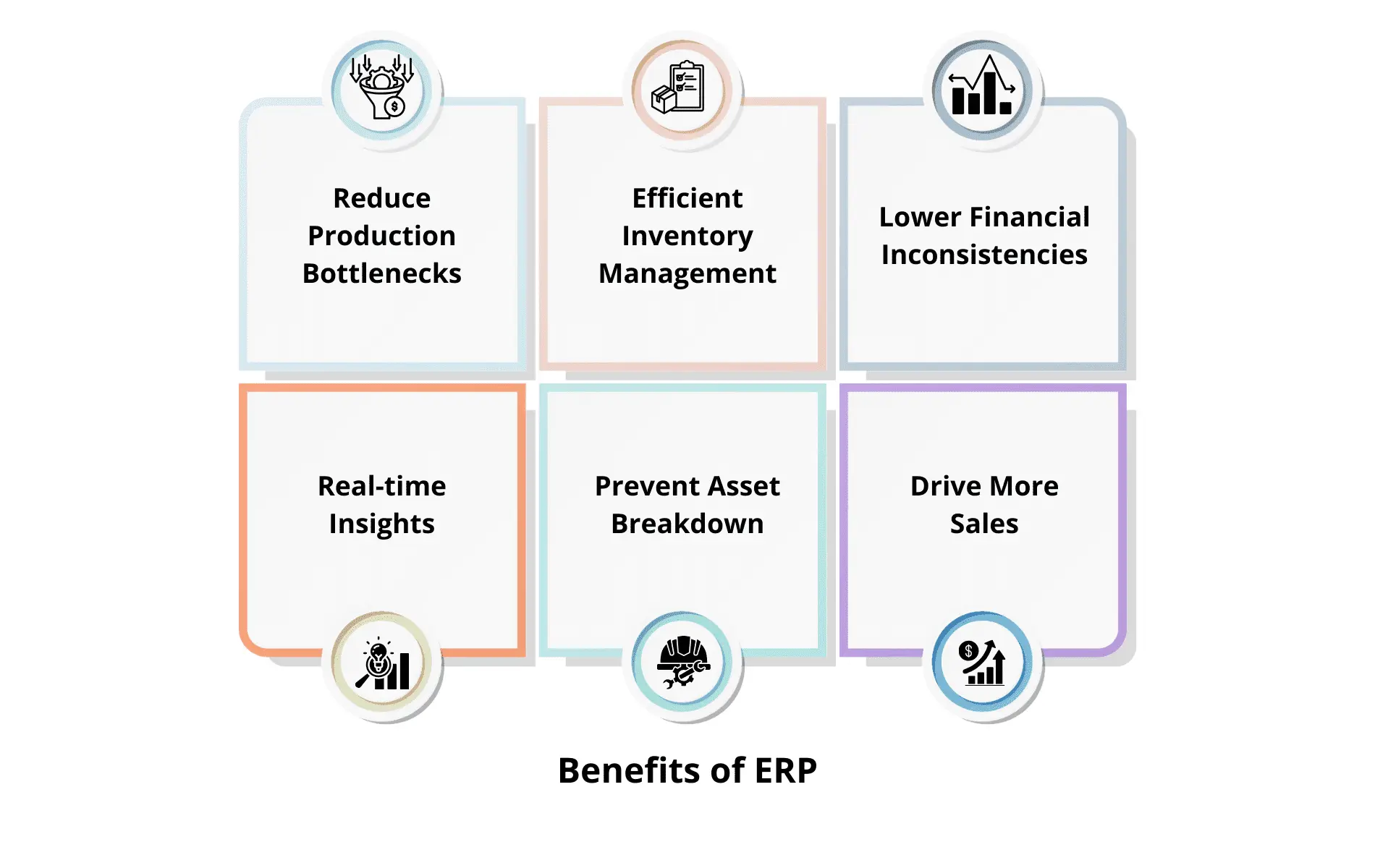ERP Examples
Discover robust, scalable, and industry-tailored ERP examples to manage costs efficiently and drive growth

Enterprise Resource Planning (ERP) is a unified system of information management that collects, analyzes, manages, and interprets data on various business processes such as purchases, sales, inventory, customer relationships, supply chain, human resources, and finance, among others, to facilitate strong data-backed decision-making and bringing efficiency & consistency across different business processes.
ERP Software is often described as the lifeblood or the central nervous system of businesses that compete in today’s highly uncertain environment, and rightly so. It acts as a singular & reliable source of truth that provides access to the most accurate & up-to-date information. It promotes a smooth flow of communication across different business functions to help your business mitigate risks, combat industry-specific challenges, compete with others, and thrive.
Top 10 ERP Examples of 2025
Now, let us have a look at the best ERP software examples:
1. Sage X3
Sage X3 stands out as the best ERP software in India as it takes care of everything from project planning, demand forecasting, sales performance management, cash flow management, supply chain management, and expense management to financial management. It provides advanced planning & forecasting features to capitalize on data and accelerate growth & innovation.
Benefits
- Forecast demand for your products & services and perform demand-driven production planning & analysis
- Streamline accounts receivable & payable using AR Automation and AP Automation tools
- Enhance cash flow, centralize supplier & customer info, and improve project oversight
- Highly customizable to meet your unique operational & industrial needs
Limitations
- The initial implementation step can be complex
- The implementation process may get delayed due to poor or inadequate planning
2. Oracle NetSuite
Benefits
- Easy-to-understand and intuitive interface
- Gain real-time visibility into the inventory and accurate forecasting
- Offers optimum scalability to align with your fast-paced world
- Multi-lingual, multi-company, multi-country & multi-currency
Limitations
- Expensive pricing structure
- Requires extensive training and investment of time
3. SAP
Benefits
- Gain a consistent view across your business operations
- Scalable, adaptable, and customizable to meet your growing needs
- Role-based Access Controls to limit exposure to confidential data & prevent data breach
- Access to cutting-edge technologies such as Machine Learning (ML) & Artificial Intelligence (AI), data analysis and data encryption
Limitations
- May require a significant upfront investment
- Periodic system update
4. Microsoft Dynamics 365
Benefits
- AI-powered actionable insights
- Multi-store management with project tracking, and predictive analysis capabilities
- Automate your digital marketing campaigns, generate leads, nurture sales, and boost revenues
- Comes into different pricing schemes to suit your business needs
Limitations
- Setting up and configuring it can be a difficult process
- Complex customizations can take more time and resources
5. Epicor Kinetic
Benefits
- Sophisticated tracking and end-to-end visibility into organization-wide processes
- Vendor tracking, automated order management, and order confirmation functionality
- A single system to manage material requirements, keep track of jobs, and optimize lead times
- Master Production Scheduling with the ability to manage multiple strategies at the same time
Limitations
- Limited documentation and support
- Compatibility issues may arise during third-party integration
5. Epicor Kinetic
Benefits
- Sophisticated tracking and end-to-end visibility into organization-wide processes
- Vendor tracking, automated order management, and order confirmation functionality
- A single system to manage material requirements, keep track of jobs, and optimize lead times
- Master Production Scheduling with the ability to manage multiple strategies at the same time
Limitations
- Limited documentation and support
- Compatibility issues may arise during third-party integration
6. SysPro
Benefits
- Production planning, capacity planning, quality control, and order management
- Highly scalable platform that scales as your business grows in size & complexity
- Advanced reporting and workflow automation capabilities
- Multi-lingual, and multi-currency support
Limitations
- Third-party integration can sometimes be a challenging task
- Requires a deep learning curve
7. Absolute ERP
Benefits
- Effectively control your manufacturing resources and minimize costs
- Flexible, scalable, and customizable platform that supports rapid & sustainable growth
- Budgeting, project management,
- Promotes a smooth flow of data within the organization
Limitations
- Complex user-interface
- Third-party integration challenges may occur
8. Infor
Benefits
- Modern and intuitive user interface
- It’s highly scalable so you can continue benefiting from it
- Supports multi-regulatory requirements
- Support for integration with Microsoft Office, SQL Server Database, and Open APIs
Limitations
- It is relatively costly
- Customization may require specialized expertise
9. Ramco ERP
Benefits
- Leverage the power of Machine Learning (ML) and Artificial Intelligence (AI)
- Expense monitoring, activity planning, and inventory management capabilities
- Manage operational machinery and organizational assets
- Production planning, scheduling, and quality control mechanisms
Limitations
- Higher license costs
- Limited documentation and support
10. IFS Cloud
Benefits
- Sophisticated risk assessment, inbound logistics, and manufacturing planning
- Enhance service deliverability, asset availability, and workforce efficiency
- Stay ahead of your competitors and minimize non-compliance risks
- Automate processes, manage work orders, track costs & schedule your projects
Limitations
- Limited customizability
- Limited industry-wide features
Remarkable Benefits of Implementing These Top ERP Examples
The top ERP system examples we’ve discussed offer a plethora of benefits to their users. According to a research report by Grand View Research, the ERP market was valued at $54.76 Billion in 2022. It is expected to grow at a CAGR of 11% till 2030. An increasing number of businesses across the globe are adopting ERP to benefit from automation, modern technological adoption, and increased efficiency.
Let’s discuss each of the benefits of ERP in more detail:
1. Reduce Production Bottlenecks
Manufacturers use Manufacturing ERP Software to automate production-related activities such as automated quality checks, evaluation of supplier performance, and ensuring continuous supply of raw materials. It reduces production bottlenecks and optimizes the process for faster speed & lower costs.
2. Efficient Inventory Management
The Inventory Management System plays a crucial role in the management of the inventory. It saves your inventory storage space & costs and improves the Inventory Turnover Ratio. Whenever the inventory threshold reaches a predetermined level, it sends automated alerts to the concerned personnel.
3. Lower Financial Inconsistencies
The Finance module in ERP offers yet another benefit — powerful forecasting and budgeting tools that help you adhere to the latest industry standards and regulatory directives. You can avoid common pitfalls, and automate various tasks such as the generation of invoices, payroll, and financial statements.
4. Real-time Insights
BI tools in ERP provide you with a 360-degree overview and up-to-the-minute insights into organization-wide activities. For example, chemical companies use the ERP for chemical manufacturing to gain intelligent insights to simplify complex supply chains, despite variations in the raw materials.
5. Prevent Asset Breakdown
The Asset Management System in ERP keeps track of organization-wide assets and helps you with regular maintenance to reduce the likelihood of asset breakdown. As a result, your company benefits from a longer asset lifespan and higher returns on the assets.
6. Drive More Sales
With a CRM System in place, you will benefit from a centralized database that consists of information about your customers & potential customers, lead sources, and past interactions. It will help you understand consumer preferences, identify new trends, and run personalized campaigns to boost sales.
What are the Limitations of ERP?
Much like any other technology, ERPs have certain limitations. Here are the most common limitations of our ERP examples:
1. Higher Costs
The ERP cost was traditionally higher due to one-time license fees, training, and other costs. However, this isn’t an issue anymore due to the availability of the cost-effective Cloud ERP.
2. Implementation Delays
Another limitation of the ERP software examples is implementation delays that may occur due to poor planning, and a lack of coordination.
3. Customization Limitations
Some low-quality ERPs do not support additional customizations. As a result, you risk getting a limited feature set.
4. Inadequate Training
A lack of employee training can potentially derail your initial efforts and implementation. Inadequate training can also lead to poor performance and human errors.
Real-World ERP Examples for Different Business Types
Manufacturing Companies
Manufacturing ERP allows manufacturers to plan their complex production processes, keep costs under control, track stock of inventory, and minimize supply chain disruptions. It automates various processes such as quality control, vendor management, and regulatory compliance to meet everyday business needs.
Food & Beverage Companies
ERP for food industry is among the important ERP software examples. It empowers food and beverage companies with robust food formulation management, seamless order management, and food quality & safety compliance features. It allows them to reduce wastage of perishable food products, enhance production efficiency, and improve quality & traceability.
Automotive Companies
Automotive ERP is among the key ERP system examples that provide access to built-in modules, design integration features, and sophisticated tools for accurate production planning, custom reporting, and performance analysis. It enables automotive companies to stay competitive and face business challenges in today’s highly dynamic & customer-centric business landscape.
Furniture Companies
ERP for furniture manufacturing is an all-encompassing solution that provides sophisticated production planning, cost control & analysis, and forecasting capabilities to stay competitive and adapt to changing market requirements.
Chemical Companies
ERP for chemical industry is among other ERP software examples that provide access to state-of-the-art technology to manage everything from raw materials to finished goods, maintain optimal product costs, detect inefficiencies, and meet global compliance requirements.
Gain Unparallel Visibility & Efficiency with All-encompassing Sage X3
Undoubtedly, ERP has become an integral part of our modern-day businesses. The ERP examples we’ve outlined, help your business automate routine tasks, optimize sales & marketing campaigns, minimize inventory storage costs, and provide unrivaled data security.
Sage X3 goes beyond what a traditional legacy tool offers. It consolidates data from a diverse dataset, breaks down data silos, provides a panoramic view of all the organizational activities, and equips decision-makers with business intelligence & powerful analytical tools for strategic decision-making.
Top Industries Leveraging ERP Software
Food & Beverage
Alcohol
Pharmaceuticals
Advertising
IT Services
Furniture
Manufacturing
Auto Ancillary
Pharma Trading
Packaging
Medical Device
Chemical
Plastic
Brewery
Logistics
Automotive
Related ERP Articles
Frequently Asked Questions
What are the Common Modules of the Top ERP Examples?
Top ERP examples may include a variety of modules depending on different factors such as your business requirements and budgets. More the modules of ERP, the higher the ERP cost.
Here are the most common modules:
What is an example of ERP in daily life?
Sage X3 is one of the most popular ERPs used by businesses across various industries in India. It is a multi-functional solution that unifies your business operations and provides detailed insights to improve your business efficiency, enhance the effectiveness of your marketing campaigns, and enhance sales forecasting accuracy.
Schedule Product Tour
"*" indicates required fields
